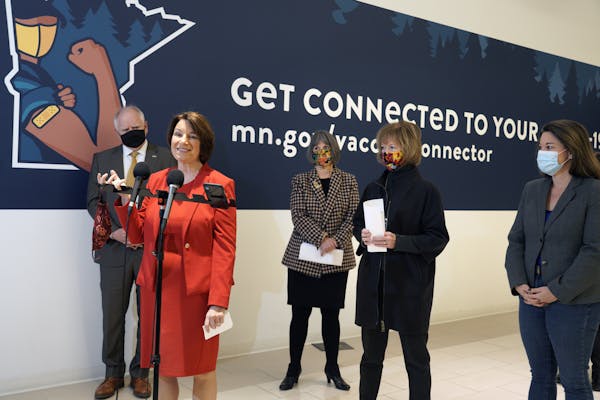Minnesota Senate Republicans are aiming to curb the executive powers that have enabled Gov. Tim Walz to impose a mask mandate, change how businesses and schools operate and restrict social gatherings.
A year after Walz first declared a state of peacetime emergency, allowing him to act quickly during the COVID-19 pandemic, the GOP-controlled Senate voted 38-29 Monday on a proposal that would make it easier for them to end those powers.
"Balance needs to be restored. We need to become coequal branches of government again," said Sen. David Osmek, R-Mound, who sponsored the bill he said would once again make legislators active partners with the executive branch.
The state's Executive Council approved rolling back some of the COVID restrictions on gatherings, concerts and restaurants. The council also voted Monday to extend the peacetime emergency for another 30 days. Walz told the council, which he leads and is composed of the state's constitutional officers, that his administration has been talking with legislators about how to close the emergency powers "toolbox."
"It's not as simple as just saying, 'Stop the peacetime emergency.' Because there will be a cascade of effects that will happen, and there needs to be a firewall built against that," said Walz, a Democrat.
He said later Monday morning that he is frustrated lawmakers haven't codified into law some of his executive orders around vaccines and evictions so there's a system in place if his powers suddenly end. Osmek said he is unsure which orders he would want to continue because there haven't been any negotiations around that. Instead, he said Walz has sent a list of "demands."
The Senate proposal would not allow the state of emergency to be extended unless a majority of members in both the House and Senate approved a continuation. Currently, both the Democratic-led House and the Republican majority in the Senate would have to vote to end the emergency for the status to be lifted.
Democrats have contended that it is too soon to end Walz's powers, and they have been a bulwark against the GOP efforts. However, Senate Majority Leader Paul Gazelka, R-East Gull Lake, said if the state of emergency continues through May it could become part of end-of-session budget negotiations. House Speaker Melissa Hortman, DFL-Brooklyn Park, said the issue should not get in the way of a budget deal.
"Sixteen times, we have voted to allow this governor to continue to do the job that he's doing to save Minnesotans' lives," Hortman said. "We have exercised our power to continue to give the governor his power, because we think he's doing a great job."
Senate Democrats stressed Monday that the Legislature operates deliberatively and cannot pass legislation at the pace the pandemic requires. They said the change would lead to gridlock.
"There does come a time for the end of emergency powers, but this nation is not at that time," said Sen. Nick Frentz, DFL-North Mankato, who said governors in 48 states still have emergency powers, as does President Joe Biden.
Republicans, meanwhile, noted legislatures in at least 40 states are considering more than 200 bills or resolutions to limit or provide oversight of their governors' emergency powers or spending.
"We will do what needs to be done" to respond to the pandemic, said Sen. Michelle Benson, R-Ham Lake. "But there has to be collaboration and balance, and the voices across Minnesota need to be heard. We are a year into this fight. We will be much more effective if we can be more collaborative."
Staff writer Briana Bierschbach contributed to this report.
Jessie Van Berkel • 651-925-5044
